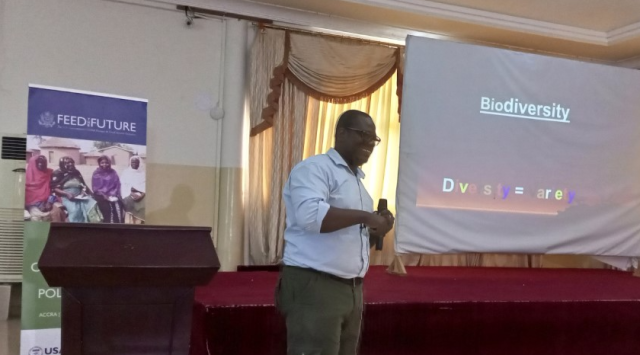By Nicholas Osei-Wusu
Overexploitation of available natural resources such as forest reserves and aquatic life, application of harmful chemicals and other practices in agricultural production, and bad governance practices in the management of the resources have been identified as common human activities worsening the negative effects of climate change on Ghana in particular.
According to a Senior Lecturer at the Faculty of Renewable Natural Resources at the Kwame Nkrumah University of Science and Technology, Dr. Winston Asante, even though climate change is a natural phenomenon with implications for man and his environment, inadequate education among people on the mutually beneficial relationship between humans and the natural environment is leading to deliberate but avoidable destruction of biodiversity, with or without knowledge about the long-term impacts on human life.
Key among the surest measures to address this challenge, according to Dr. Asante, are strict enforcement of existing laws protecting natural resources, enhanced public education, and regular and sustainable sources of funding.
He was speaking to Correspondent Nicholas Osei-Wusu on the fringes of a Media Capacity Enhancement on Climate Change in Koforidua, in the Eastern region.
Dr. Asante told the GBC that some parts of the natural environment, including the land, water sources, and life in them, animal species and plants, are either extinct, near extinct, or seriously endangered as a result of bad practices by members of the public sometimes, as a result of ignorance of the importance of those parts of biodiversity.
“There are concerns about biodiversity decline. There are species that are getting vulnerable, others are getting extinct and others are threatened or critically endangered. That means, as human beings, we are doing things beyond the natural processes. As for th natural processes there nothing we can do. There are drivers and pushes that human beings are adding to these natural processes are what are if concern. The way we develop, the way we exploit natural resources, the way we conduct agriculture, the use if agro chemicals. They all have different ways they impact on the ecosystem or areas where these organisms live; be it in water bodies or on land,” he explained further.
Dr. Asante noted however, that with determination, the country could restore some of those lost and also protect those in the system for the benefit of man.
He said, “we have best management practices. There are protocols and provisions to sustainably exploit resources. There are conservation practices that we can employ to protect these organisms and if get those that are endangered bounced back. It involves a lot if capacities, knowledge, finance and technologies.”
The Climate Lead of Feed the Future Ghana PolicyLink, Dr. Gerald Forkuo, explained that, organisation of the media capacity enhancement on climate change, was a recognition and appreciation of the crucial role journalists play in awareness creation and also the need to ensure accurate reportage on issues related to the climate change phenomenon.
Dr. Forkuo explained that the training was partly in response to a call by the Ghana Agriculture and Rural Development Journalists Association, GARDJA, for capacity development of Journalists.
Some of the participants shared their experiences in covering the various Conferences of Parties or CoP over the years with the participants to motivate them to take climate change reporting serious.
ABOUT THE MEDIA ENHANCEMENT CAPACITY ON CLIMATE CHANGE
The two-day training was to enhance the capacity of selected journalists to adequately report on issues of the climate phenomenon, its various forms, factors contributing to it, its effects on individuals and country as well as measures being adopted at the local and national levels to mitigate its harsh impacts.
The capacity enhancement event was organized by Feed the Future Ghana PolicyLink in partnership with the Environmental Protection Agency with the support of USAID.
Experts from the academia and the Environmental Protection Agency, EPA, took the journalists, chosen from both state-ran and privately owned media organizations, from various parts of the country, through carefully selected topics in the arena of climate change.
These were biodiversity or the symbiotic relationship between humans and the natural environment, Sustainable Land Restoration and Forest Management as well as Climate Investment and Financing.







![“It’s hard to say goodbye” – Christian Atsu’s wife composes emotional tribute song for him [Video]](https://ghananewss.com/storage/2023/05/Christian-atsu-and-wife-100x75.jpeg)





